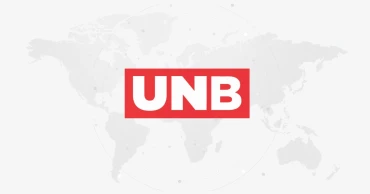Colleges
ChatGPT maker releases tool to help teachers detect if AI wrote homework
The maker of ChatGPT is trying to curb its reputation as a freewheeling cheating machine with a new tool that can help teachers detect if a student or artificial intelligence wrote that homework.
The new AI Text Classifier launched Tuesday (January 31, 2023) by OpenAI follows a weeks-long discussion at schools and colleges over fears that ChatGPT’s ability to write just about anything on command could fuel academic dishonesty and hinder learning.
OpenAI cautions that its new tool – like others already available – is not foolproof. The method for detecting AI-written text “is imperfect and it will be wrong sometimes,” said Jan Leike, head of OpenAI’s alignment team tasked to make its systems safer.
Read More: What is ChatGPT, why are schools blocking it?
“Because of that, it shouldn’t be solely relied upon when making decisions,” Leike said.
Teenagers and college students were among the millions of people who began experimenting with ChatGPT after it launched Nov. 30 as a free application on OpenAI’s website. And while many found ways to use it creatively and harmlessly, the ease with which it could answer take-home test questions and assist with other assignments sparked a panic among some educators.
By the time schools opened for the new year, New York City, Los Angeles and other big public school districts began to block its use in classrooms and on school devices.
Read More: CES 2023: Walton's smart AI products get huge response
The Seattle Public Schools district initially blocked ChatGPT on all school devices in December but then opened access to educators who want to use it as a teaching tool, said Tim Robinson, the district spokesman.
“We can’t afford to ignore it,” Robinson said.
The district is also discussing possibly expanding the use of ChatGPT into classrooms to let teachers use it to train students to be better critical thinkers and to let students use the application as a “personal tutor” or to help generate new ideas when working on an assignment, Robinson said.
Read More: AI & Future of Jobs: Will Artificial Intelligence or Robots Take Your Job?
School districts around the country say they are seeing the conversation around ChatGPT evolve quickly.
“The initial reaction was ‘OMG, how are we going to stem the tide of all the cheating that will happen with ChatGPT,’” said Devin Page, a technology specialist with the Calvert County Public School District in Maryland. Now there is a growing realization that “this is the future” and blocking it is not the solution, he said.
“I think we would be naïve if we were not aware of the dangers this tool poses, but we also would fail to serve our students if we ban them and us from using it for all its potential power,” said Page, who thinks districts like his own will eventually unblock ChatGPT, especially once the company’s detection service is in place.
Read More: How Can Artificial Intelligence Improve Healthcare?
OpenAI emphasized the limitations of its detection tool in a blog post Tuesday, but said that in addition to deterring plagiarism, it could help to detect automated disinformation campaigns and other misuse of AI to mimic humans.
The longer a passage of text, the better the tool is at detecting if an AI or human wrote something. Type in any text -- a college admissions essay, or a literary analysis of Ralph Ellison’s “Invisible Man” --- and the tool will label it as either “very unlikely, unlikely, unclear if it is, possibly, or likely” AI-generated.
But much like ChatGPT itself, which was trained on a huge trove of digitized books, newspapers and online writings but often confidently spits out falsehoods or nonsense, it’s not easy to interpret how it came up with a result.
Read More: Ai and Future of Content Writing: Will Artificial Intelligence replace writers?
“We don’t fundamentally know what kind of pattern it pays attention to, or how it works internally,” Leike said. “There’s really not much we could say at this point about how the classifier actually works.”
Higher education institutions around the world also have begun debating responsible use of AI technology. Sciences Po, one of France’s most prestigious universities, prohibited its use last week and warned that anyone found surreptitiously using ChatGPT and other AI tools to produce written or oral work could be banned from Sciences Po and other institutions.
In response to the backlash, OpenAI said it has been working for several weeks to craft new guidelines to help educators.
Read More: Ameca: World’s Most Realistic Advanced Humanoid Robot AI Platform
“Like many other technologies, it may be that one district decides that it’s inappropriate for use in their classrooms,” said OpenAI policy researcher Lama Ahmad. “We don’t really push them one way or another. We just want to give them the information that they need to be able to make the right decisions for them.”
It’s an unusually public role for the research-oriented San Francisco startup, now backed by billions of dollars in investment from its partner Microsoft and facing growing interest from the public and governments.
France’s digital economy minister Jean-Noël Barrot recently met in California with OpenAI executives, including CEO Sam Altman, and a week later told an audience at the World Economic Forum in Davos, Switzerland that he was optimistic about the technology. But the government minister — a former professor at the Massachusetts Institute of Technology and the French business school HEC in Paris — said there are also difficult ethical questions that will need to be addressed.
Read More: ChatGPT by Open AI: All you need to know
“So if you’re in the law faculty, there is room for concern because obviously ChatGPT, among other tools, will be able to deliver exams that are relatively impressive,” he said. “If you are in the economics faculty, then you’re fine because ChatGPT will have a hard time finding or delivering something that is expected when you are in a graduate-level economics faculty.”
He said it will be increasingly important for users to understand the basics of how these systems work so they know what biases might exist.
3 years ago
BUET hosts 'Robo Carnival' for schools, colleges, varsities
The Bangladesh University of Engineering and Technology (BUET) has launched a two-day long 'Robo Carnival' to inspire students to make robots to make smart Bangladesh with the slogan 'Build Robot for Smart Bangladesh'.
The two-day long carnival starts at the ECE building around 10 am today (January 19) and BUET vice Chancellor Dr Sattyaprashad Majumdar was the chief guest.
About 500 students, divided into 125 groups, from the different schools, colleges and universities of the country are taking part in the two-day carnival.
The carnival has been arranged to teach and inspire the students about different segments of Robotics like dust collecting robot competition, and firefighter robot competition.
Besides the firefighter robot and trash collector robot competition, a project showcasing part, a workshop on Robotics Simulation software and a robotics olympiad for the competitors have been arranged.
Tarikul Islam Tanvir, a student of Gopalganj Polytechnic Institute, who has developed an 'Earthquake digital safety system', said on his project: "We know that when an earthquake happens, many people die from being electrocuted. The safety system that I have developed will reduce the danger of being electrocuted in case any earthquake happens."
"This safety system can detect earthquake vibration automatically and immediately after it cuts off the electricity lines and water supply lines. Besides, it sends automatic calls to alert the user about the earthquake. This system can be installed in every residential house and industrial sector but if the device is installed in district supply lines then there is no need to install the system separately in individual houses or industrial factories," Tanvir added.
At the initial stage, BUET students took initial tests and presentations of the projects and later BUET teachers evaluated those projects.
Read more: Ameca: World’s Most Realistic Advanced Humanoid Robot AI Platform
3 years ago
JS body suggests incorporating oceanography in schools, colleges curricula
The Parliamentary Standing Committee on Science and Technology on Wednesday recommended the government to incorporate oceanography in the curricula from grade-I to higher secondary level.
The recommendation came from the 15th meeting of the committee, held at Parliament Building with its chairman AFM Ruhal Haque in the chair, said a press release.
In the meeting, the committee of the 11th parliament reviewed the implementation progress of its previous decisions.
Read more: Parliamentary Committee suggests reopening of Sonamasjid land port for immigration
The parliamentary watchdog asked the government to implement its recommendations made in the previous meetings.
Science and Technology Minister Architect Yeafesh Osman joined the meeting on an invitation of the committee’s chief.
Committee members Iqbalur Rahim, Shafiqul Azam Khan, Mozaffar Hossain, Sherin Ahmed and Selima Ahmad attended the meeting.
Read more: Parliamentary body for increasing DNA, dope test labs
3 years ago
Covid surge: Closure of schools, colleges extended until Feb 20
The government on Wednesday extended the closure of secondary and higher secondary-level educational institutions by two weeks until February 20, taking the worsening Covid-19 situation in the country.
“The closure of schools and colleges has been extended by two weeks,” MA Khair, public relations officer of the Education Ministry, told UNB.
Read: Keep schools open to avert learning catastrophe: UNICEF
On January 21, the government announced that all the schools and colleges of the country will remain closed from January 21 to February 6 in an effort to curb the spread of Covid-19 pandemic.
The following day, the Ministry of Education issued an 11-point directive, including resuming online classes, for schools and colleges during the closure.
Besides, the vaccination of students aged between 12 to 17 years against Covid-19 was directed to be continued following the health guidelines in coordination with the zonal offices of the Directorate of Secondary and Higher Education, District Education Office, Upazila Secondary Education Offices, local administration and Civil Surgeons.
After a long closure due to the pandemic, the students of schools and colleges in Bangladesh returned to their classrooms on September 12 last year.
Read:Schools, colleges to return to online classes: Ministry
The government shut the educational institutions on March 17, 2020, after the country reported its first Covid-19 cases on March 8 and later the closure was extended several times.
4 years ago
Exams scrapped, students block busy Dhaka crossing
Students of seven government colleges affiliated to Dhaka University blocked the Nilkhet intersection on Saturday morning in protest against the government's decision to suspend exams.
Over 100 students took to the streets around 9am and staged demonstrations for nearly two hours, disrupting morning rush-hour traffic in the busy area.
A student, who did not wish to be named, told UNB that they were not intimated about the suspension of their exams earlier and they came to know about the same only after reaching the test centers.
After staging their protest till 11am, the students went to the Dhaka University campus to meet the controller of exams. Later they went to meet the Eden College authorities at the controller's request.
READ: Job seekers block city roads demanding extension of age limit for govt job
Government Bangla College student Rabeya said, "We blocked the busy Nilkhet crossing to protest the sudden suspension of our exams."
Vehicular movement on the busy road remained halted for two hours following the protest, causing immense sufferings to commuters.
READ: Students block Rampura road protesting SSC examinee’s death in road crash
Earlier on Friday, the government announced the closure of all schools, colleges and universities of the country from January 21 to February 6 in an effort to curb the spread of Covid-19 in Bangladesh.
4 years ago
Schools, colleges that’ll see infection surge to be shut: Dipu Moni
If there is any report or possibility of rise in Covid cases in any educational institution then those will be closed, said Education Minister Dipu Moni on Saturday.
“But no such situation has so far arisen anywhere. If any report comes, we’ll take steps,” she said while talking to reporters after the inauguration of Bangabandhu-Bapu Digital Exhibition at the Shilpakala Academy.
“We don’t want to bring the pre-primary level students to educational institutions now. After three weeks, we’ll take a decision on it,” said Dipu Moni.
Also read: Five girl students contract Covid in Thakurgaon school
4 years ago
Students in Bangladesh burst into joy as schools, colleges reopen
The students of schools and colleges in Bangladesh returned to their classrooms on Sunday with much enthusiasm after a long closure due to the Covid-19 pandemic.
With the return of thousands of students, the campuses wore a festive look with all covering faces with masks and maintaining social distance.
Students were seen entering their schools standing in queues in the morning and washing their hands at the school premises with soap or sanitizing those, reports a UNB correspondent visiting a number of schools in Dhaka.
Body temperature had been checked by school authorities before they entered their classrooms.
Read: No tiffin, masks at a premium, & may close again: Students return to school tomorrow
In some schools, isolation rooms were opened as a precautionary measure so that any student falling sick during the school hours can stay there.
To maintain social distancing rules, authorities in some schools have allocated one room for a limited number of students and one bench for one student.
Junior school students will be allowed one day in a week to attend their classes in person, as per the government rule.
Besides, the students of PEC, SSC and HSC have been asked to attend their classes regularly.
4 years ago
Educational institutions being prepared for reopening Sep 12
Education minister Dr Dipu Moni has said that the country's educational institutions will be ready to host students by September 9, before finally reopening three days later - bringing to an end what Unicef has called the world's second-longest schools closure due to Covid-19.
“Ministry officials will complete field inspections within Sep 9 to observe whether the institutions are fully prepared to open their doors for students,” she said.
“No one will be allowed entry to school and colleges without a mask after reopening. The parents will have to play a vital role in this,” she added.
Dipu Moni was speaking to the press after an inter-ministerial meeting at the cabinet division on Sunday.
The decision to reopen all the primary, secondary and higher secondary-level educational institutions on September 12 was finalised at the meeting.
After the reopening, the SSC and HSC examinees of 2020-2021, and the students of class 5 will attend classes regularly while the students of class 1-4 and 6-9 will attend classes once a week initially, Dipu Moni further said. Eventually, all the classes will be held regularly.
Also read: UNICEF welcomes Bangladesh’s decision on reopening schools
4 years ago
Govt planning to take classes one day a week initially: Nowfel
The Ministry of Education is planning to take classes one day a week after the reopening of schools and colleges on September 12, said Deputy Minister for Education Mohibul Hasan Chowdhury Nowfel on Saturday.
Nowfel said this while talking to journalists after attending a function at Chattogram Medical College and Hospital.
“We’re hopeful of starting physical classes following the Education Minister’s announcement and our primary plan is to take classes one day a week but it may be changed,” he said.
Also read: Schools, colleges to reopen on Sept 12: Dipu Moni
Efforts will continue to take the SSC and HSC exams through in-person presence with a brief syllabus but the assignment works will continue as before, he said.
The long closure of schools and colleges due to the Covid-19 pandemic has created a mental pressure on the students and there had been efforts to continue education online but that was not enough, Nowfel added.
4 years ago
Schools, colleges to reopen on Sept 12: Dipu Moni
Primary, secondary and higher secondary educational institutions in the country will reopen on September 12 after a prolonged closure, said Education Minister Dipu Moni on Friday.
“The decision was taken in a joint meeting of the Education Ministry, Ministry of Primary and Mass education and the National Technical Advisory Committee held on Thursday night,” she said at a function in Chandpur sadar upazila.
“Hopefully, we’ll be able to reopen all the schools, colleges, including madrasas, on September 12 as per the decision,” Dipu Moni said.
Read: Schools, colleges to reopen on May 23
Regarding the opening of universities, the minister said the decision is still pending as the Vice Chancellors of public universities want to see all the students are vaccinated-- at least the first dose of Covid-19 vaccines.
Read: School reopening awaits decision from the highest level, says state minister
“We’ll hold another meeting with them. If they want, they can reopen with other educational institutions or fix another date following the decision of the syndicate committees of their universities,” said Dipu Moni.
4 years ago
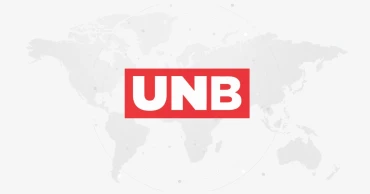
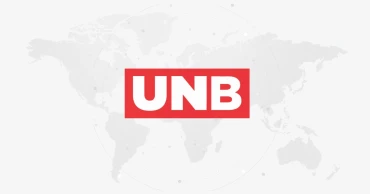
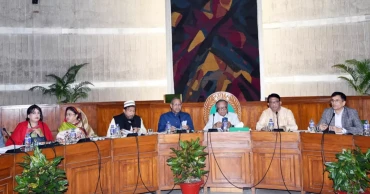
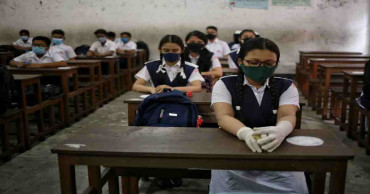

.jpg)
.jpeg)


